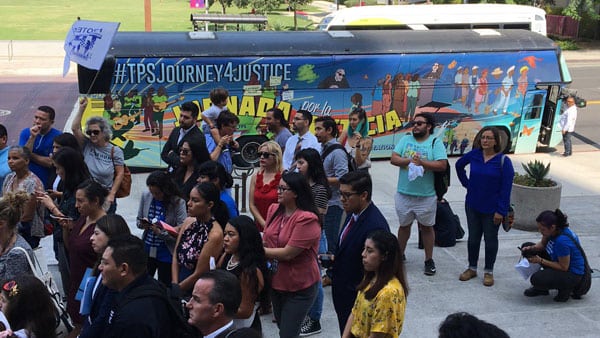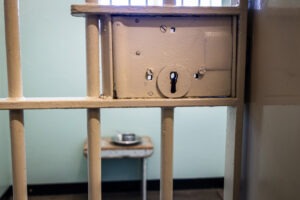
August 20, 2018; Colorlines
This week, a group of US residents who had been living under Temporary Protected Status (TPS) started on the long road from Los Angeles to Washington, DC. They plan to caravan across the country for 12 weeks and end in the nation’s capital, where they will ask Congress to pass legislation allowing them to apply for permanent residency.
TPS is a form of humanitarian relief that allows immigrants fleeing civil unrest and natural disasters in their home countries safe harbor as legal residents in the United States. This year, President Trump has ended TPS status for people from El Salvador, Honduras, Haiti, Nicaragua, Nepal, and Sudan. NPQ has reported that ending the program benefits neither the residents who will be kicked out nor the US. Over 400,000 US residents are affected by this decision and have been given 18 months to leave the United States or obtain another form of legal residency status.
The caravan, referred to as the TPS Journey for Justice Caravan, is being organized by the National TPS Alliance, the Central American Resource Center, and the National Day Laborer Organizing Network (NDLON). All three organizations are community-based, member-led advocacy groups.
The launch website reads,
On August 17th, over 50 immigrants with Temporary Protected Status (TPS holders or TPSianos), their family members, and other civil rights leaders will embark on a journey across the United States to lift our collective voices against the termination of TPS, against the expulsion of hundreds of thousands of lawfully present immigrants & against the criminalization of migration in an effort to promote immigrant legalization, to promote political equality, and to promote the power of immigrant courage to prevail against Trump’s campaign of fear.
The journey, with events across the country, will motivate local communities to organize and connect in a national campaign to fight for permanent residency and protect TPS families.
The #TPSJourney4Justice is a grassroots, bottom-up initiative to strengthen, unify, and elevate the voices of TPS holders, build local alliances and support networks, and establish alignment and solidarity with immigrant communities across the country. We intend to bring together tens of thousands of TPS holders and allies and invite them to join the fight to #SaveTPS & #ProtectTPS.
Sign up for our free newsletters
Subscribe to NPQ's newsletters to have our top stories delivered directly to your inbox.
By signing up, you agree to our privacy policy and terms of use, and to receive messages from NPQ and our partners.
Events along the route include parades, workshops, “vigils, community assemblies, know-your-rights sessions, forums, roundtable discussions, concerts, demonstrations, leadership-development activities and meetings with political candidates and elected officials.”
NDLON tweeted, “Do not be afraid. TPS families are on a journey to #ProtectTPS, and they are going to liberate America from its fear of immigrants. #CourageOverFear #TPSJourney4Justice.”
Los Angeles Mayor Eric Garcetti and Representative Jimmy Gomez were among the officials present at the caravan’s kickoff.
TPS holders from Haiti and El Salvador have also filed a lawsuit against the president, the Department of Homeland Security, the Secretary of the Department of Homeland Security, and the Deputy Secretary of the Department of Homeland Security, claiming that “The decision…to terminate TPS designation for Salvadorans and Haitians was impermissibly infected by invidious discrimination on the basis of race, ethnicity, and/or national origin and therefore cannot stand.…The conditions that initially led to the TPS designations of El Salvador and Haiti are nothing short of extreme and, in many ways have only worsened over time.” The administration tried to terminate the lawsuit, but a federal judge ruled that it could move ahead.
The TPS Journey for Justice joins a long line of protest caravans to the US capital, most famously the March on Washington in 1963. In 1968, members of the Poor People’s Campaign Caravan followed eight different routes to DC to protest poverty. More recently, the Mexico Caravan for Peace protested the war on drugs in 2012; the We Belong Together Kids Caravan protested immigration policies and advocated workers’ rights in 2017; and the Apache Stronghold Caravan protested the giveaway of sacred land in 2014. That the TPS Journey for Justice chose this mode of protest is both practical and symbolic, joining the march to a tradition of US civil rights advocacy.
Edwin Murillo, a 42-year-old immigrant from El Salvador who is traveling with the caravan, said, “We need some solutions for us.” His wife says they have been here for 20 years.
The march has already reported warm receptions in Phoenix and Las Vegas.—Erin Rubin













